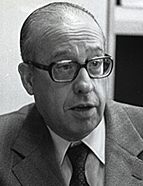

He began to reflect on the history of the Portuguese discoveries and expansion. Around 1943-1945, he published two pivotal works which were milestones in his career: A Expansão Quatrocentista Portuguesa. Problemas das origens e da linha de evolução e os Documentos sobre a Expansão Portuguesa [Fifteenth-century Portuguese Expansion. Origins and Evolution Line Issues and Portuguese Expansion Documents]. He first formulated questions, and only then searched for materials in archives and libraries – where very few things escaped his scrutiny – thus compiling his own sources. From a very early stage he perceived the historical source as the outcome of intellectual quest.
Quite didactic in form (the Documents were first and foremost intended for his students at the Faculdade de Letras) he raises questions and suggests ways of studying to understand the meaning of the Portuguese expansion. Right here the historical source is viewed as a manifestation or expression with cultural meaning. It involves using what Lucien Febvre termed as a mental tool “Sources are compiled in correlation with the construction of the facts themselves.” “The construction of documentation […] is, in itself, a historical fact and simultaneously a source as it is a cultural work that sheds light upon mental attitude in its entirety, a comprehensive tool […].” “To my mind, whenever possible, history should be grounded predominantly on published sources and it would be ideal if it were grounded exclusively on such sources so that its interpretations could be verified by all (the universal nature of verifiability is indispensable in science).”
The Documents were a “breath of fresh air in the stiff national historiographical practice.” The great figures of the regime were, however, vigilant and Alfredo Pimenta, a guardian of Catholic-political orthodoxy, alerted Salazar to the “writer who embodies the most evil doctrine”, the author of a book “full of venom”, a “scientifically null” book, “wrong and sinful in doctrine.” As far as the accuser was concerned, the author, much like his Coimbra master, Sílvio Lima, who had commended the book, were pioneers of “historical materialism”! Complaints were lodged against his teaching and the Faculdade council decided to inspect his classes, an unacceptable action of policing which, it should be noted, was to be conducted by his fellow professors, and only Manuel Heleno voted against this. This was the breaking point, and Magalhães Godinho left the Portuguese University for the first time. The students protested and left with him to go to Ateneu Comercial de Lisboa [The Lisbon Commercial Atheneum] where he taught freely between 1944 and 1946. At the end of his long life, he wrote about this saying: “the regime was coherent when it dispensed with my services.” Several students from that first group would eventually focus on research: Jorge Borges de Macedo, Joaquim Barradas de Carvalho, José Gentil da Silva, Julião Soares de Azevedo, Joel Serrão, Artur Nobre de Gusmão, Mário Soares.
